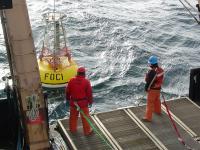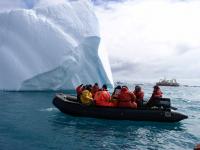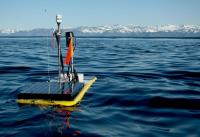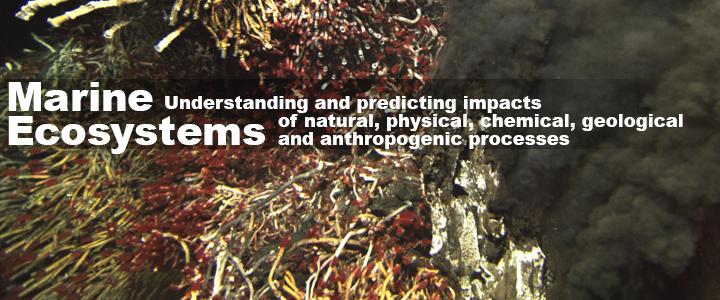Marine Ecosystem Research
Marine ecosystem research at PMEL is focused on measuring, understanding, and predicting impacts of natural physical, chemical, biological, geological, and anthropogenic processes on the oceanic web of life. PMEL's primary contribution is to put the biological research into the context of the physical and geochemical settings. PMEL marine ecosystem research is focused primarily along the U.S. Pacific and Arctic ocean coastal zones, but efforts are global with respect to explorative research and fundamental processes.
Marine Ecosystem Research Activities
Ecosystems & Fisheries Oceanography Coordinated Investigations (EcoFOCI) - EcoFOCI is a collaborative research effort by both UW (JISAO) and NOAA scientists at the Pacific Marine Environmental Lab (PMEL) and the Alaska Fisheries Science Center (AFSC) who focus on the unique and economically important high-latitude ecosystems of Alaska. The mission of the EcoFOCI Program is to understand the dynamic relationships among climate, fisheries, and the marine environment to ensure sustainability of Alaskan living marine resources and healthy ecosystems.
Earth-Ocean Interactions - Renowned for interdisciplinary seafloor and water column processes work at numerous volcanic and hydrothermal sites around the globe, this group discovers unique chemosynthetic ecosystems and studies biogeochemical processes of global importance to address the NOAA goals of healthy oceans, technology development, and ocean stewardship.
Acoustics - Using autonomous stationary hydrophones, mobile platforms such as ocean gliders and floats equipped with acoustic sensors, and cabled observatories the Acoustics group studies both natural and anthropogenic sounds in the marine environment.
Ocean Carbon - In the open and coastal oceans, the Ocean Carbon group is currently making high-quality measurements of ocean acidification parameters, as well as ancillary properties, such as dissolved oxygen an nutrients that are related to ecosystem research.
Ocean Molecular Ecology - PMEL Ocean Molecular Ecology group seeks to leverage the advances in molecular biology to scale biological analyses with physical and chemical processes and allow for the characterization of marine ecosystems' response to climate change. We strive to achieve this through implementing four strategic goals: 1) characterize the impacts of warming, ocean acidification, and hypoxia on West Coast and Arctic marine ecosystems, 2) advance and modernize ecosystem assessments, 3) improve ‘Omics tools, and 4) support the NOAA ‘Omics strategy by developing and integrating bioinformatics and data management best practices.

Deployment of an EcoFOCI mooring in the Bering Sea.

PMEL Acoustics group in Antarctica.

The Carbon Wave Glider deployed in Prince William Sound, Alaska studying ocean acidification.



